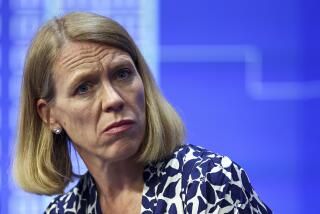Scandals Tarnish Swiss Squeaky-Clean Image
- Share via
GENEVA — In one week, the justice minister of this cautious, conservative country resigned in shame, a general was suspended for accepting a free trip, and a prominent legislator was convicted of fraud.
Last month, the Supreme Court ruled that public funds were used illegally to affect the outcome of a regional election six years ago.
Justice Minister Elisabeth Kopp’s appointment in 1984 was enormously popular. She became the first woman member of the Swiss Cabinet only 13 years after women gained the right to vote.
On Jan. 11, a special prosecutor said Kopp was suspected of passing to her husband official secrets about an investigation of possible drug-money laundering by a company of which he was a board member.
“An un-Swiss scenario, but it happened in Switzerland,” the mass-circulation newspaper Sonntagsblick declared. “This is how far we’ve come.”
‘A National Crisis’
Neue Zuercher Zeitung, a conservative paper close to the Swiss Establishment, said “a national crisis” might have resulted “if the fire had smoldered on.”
Kopp’s case focuses attention on Switzerland’s role as international financial hub, with the attendant risk of handling illegal money, and women’s roles in the nation’s politics.
She is accused of secretly warning her husband, also a lawyer, in October to cut his ties with a Zurich company because it was being investigated.
Hans W. Kopp gave up his post on the board of Shakarchi Trading AG, a Lebanese-controlled company, and prosecutors said a few days later the company may have been involved in Switzerland’s biggest money-laundering case. No charges have been filed and the company denied involvement.
After the first reports in December that her husband was tipped from inside the Justice Ministry, Kopp said she would resign at the end of February.
Quit the Same Day
Then came the special prosecutor’s report, showing she had concealed some facts, and she quit the same day. Kopp has insisted throughout, however, that she did no wrong.
Her husband has had trouble before.
He was chairman of a financial services company that collapsed in 1982 and was investigated for fraud and falsification of documents. In 1971, he was temporarily suspended from the Zurich Bar Assn. following allegations of improper conduct that never were officially explained.
A recent public opinion poll revealed concern among the Swiss about ties between government and business. Of those responding, 52% said people who serve in Parliament, a part-time job in Switzerland, should not sit on company boards at the same time.
The justice minister always publicly defended her husband, but Sonntagsblick said: “Elisabeth Kopp’s conduct is not that of a perturbed, loving wife. It is that of a coolly calculating lawyer: Always admit only what can immediately be proven.”
Man Expected Successor
Kopp’s successor is expected to be a man, but the Swiss insist that her fall will not affect opportunities for women in top political ranks.
Neue Zuercher Zeitung said: “The events leading to the resignation are so singular that they do not permit general conclusions.”
The military, a cornerstone of Swiss society, was tarnished the same day the minister resigned by suspension of the air force chief of staff for letting a domestic aircraft manufacturer pay for a two-week trip to Australia.
Officials said Brig. Gen. Alfred Ramseyer was under investigation for bribery. He has reimbursed the company for the trip.
Two days later, on Jan. 13, a chief organizer of the 1987 Alpine Ski World Championships in Crans-Montana resigned from Parliament after a court sentenced him to two years’ probation for fraud.
Hubert Bonvin, a leading politician in tourism-oriented Valais canton, was convicted of bilking it of $20,644 by taking a salary as vice president of the organizing committee while on paid sick leave from his job as a high school teacher.
While the Kopp affair was developing, the Supreme Court ordered a repeat of a 1983 referendum in the German-speaking Laufen district that kept it in Bern canton, or state, instead of moving it into Basel canton.
It said a secret payment of $210,000 by the Bern state government to a pro-Bern committee may have determined the outcome.
The Laufen vote was an indirect result of a national referendum in 1978 that created French-speaking Jura canton from territory in German-speaking Bern.
More to Read
Sign up for Essential California
The most important California stories and recommendations in your inbox every morning.
You may occasionally receive promotional content from the Los Angeles Times.













